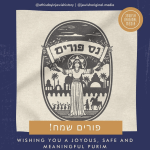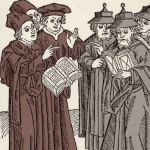On September 23, 1928, the tranquil Jewish community in rural Massena, NY, found itself entwined in an enduring narrative of persecution and slander, as they were accused of committing a blood libel. This date remains significant in Jewish history as it starkly symbolizes the relentless struggle against unfounded hatred and prejudice.
As Yom Kippur dawned, whispers tainted the air with vile accusations against the modest Jewish population, alleging them of murdering a Christian girl to extract her blood for ritualistic purposes. This unfounded charge, known as a blood libel, has tainted Jewish history since at least 1144, when the Jews of England were accused similarly, leading to their complete expulsion until the 1600s.
The disappearance of four-year-old Barbara Griffiths had turned the town’s suspicions towards the Jews of Massena, accusing them of kidnapping, murdering, and utilizing her blood for the Jewish high holidays. Rabbi Berel Brennglass of the Adath Israel congregation faced serious interrogation by NY State Police about Jewish practices concerning human sacrifice and the use of blood in food—a notion strictly prohibited according to Kosher laws.
Amidst the tense interrogation, Barbara emerged from the woods where she had been lost, leading the townspeople to insinuate that the Jews released her upon the “discovery of their plot.” Mayor Gilbert Hawes embraced this notion, calling for a boycott of Jewish-owned businesses. This egregious incident prompted the intervention of the American Jewish Congress and the scrutiny of NY Governor Al Smith, bringing about a resolution in 2-3 weeks, marked by a public apology from Mayor Hawes, who was later re-elected.
The Massena incident serves as a grim reminder that the malevolent specter of blood libel could permeate the societal fabric of the United States in the 20th century. It poses a significant reflection point, occurring in the shadow of Henry Ford’s propagation of the Protocols of the Elders of Zion and a mass Nazi rally at Madison Square Garden in NYC in 1939, five years before Hitler’s ascendancy in Europe and a little over a decade before the Holocaust. The instance forces us to ponder why the blatant signs of burgeoning Jew-hatred in seemingly “moral and just societies” were largely ignored.













Start the discussion at community.jewishoriginal.com